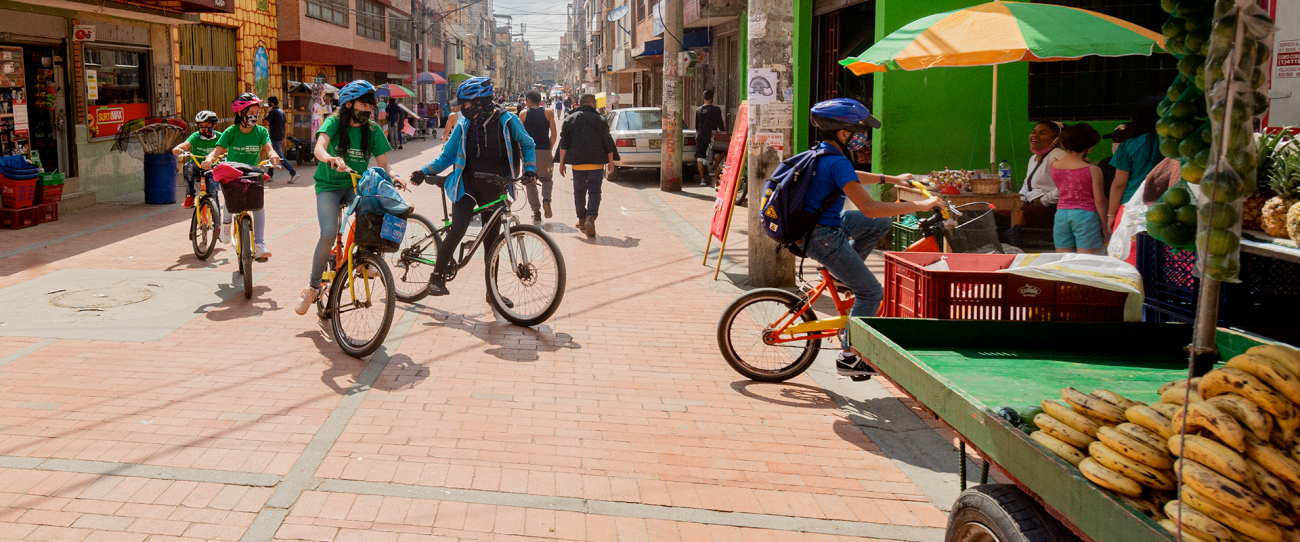OPINION: We Can All Contribute to Safer, Greener and Healthier City Streets

Like the pandemic, road safety is an issue that touches almost everyone in society.
By Valerie Julliand.
Until my older sister was involved in a car crash, road safety was not an issue I gave much thought to as a child growing up in Lyon, France. Several years after that, my other sister got injured in another crash. Both suffered severe facial injuries. And neither had been wearing a seatbelt—something that would become compulsory for all passengers in French cars in 1990.
Thankfully, my sisters’ injuries were not life-threatening. But the scars they carried were a powerful reminder to be vigilant about road safety growing up. In my 26 years of service at the United Nations, across Africa, Latin America, and Asia, improving road safety has remained a core concern. And that continues in my current capacity as the United Nations Resident Coordinator for Indonesia.
Compared to the Sriwijaya Air crash in February, or the heart-breaking sinking of the KRI Nanggala that killed 53 submariners last month, the daily tragedy of vehicle crashes is often overlooked. Around the world, road crashes kill someone every 24 seconds, the World Health Organization (WHO) determined in 2018. Indonesia reported 31,282 road crash fatalities in 2016. A cost of those deaths and serious injuries amounted to more than $37.5 million, or 4 percent of Indonesia’s GDP, that year according to a 2018 report supported by the World Bank.
This Monday, as the 6th UN Global Road Safety Week is starting, the adoption by Indonesia of the United Nations’ seven priority Road Safety Conventions would be a very welcome step. Equally, it is up to all of us to contribute to safer, greener and healthier city streets.
About two months before I took up my post in Jakarta, UN member states adopted a range of resolutions with a target of halving fatalities and injuries as a result of vehicle crashes by 2030. They also targeted providing access to safe, affordable and sustainable transport to all people by the same year. Collectively, the measures are known as the 2020 Stockholm Declaration.
Among them is a call for low-speed streets in cities worldwide. Governments can drastically improve safety limiting speeds to 30 km/h in areas where people live, work and play. In fact, pedestrians have a 90 percent chance of surviving the impact of a crash at that speed. The survival rate plummets to 10 percent for crashes at 50km/h, according to data compiled by the World Health Organization (WHO). Lower speeds also mean reduced CO2 emissions and less pollution. And they encourage healthier lifestyles by making walking and riding bicycles safer and more accessible.
That’s why, this week, the UN is calling on governments around the world to adopt the Stockholm Measures, through its #Love30 and #StreetsForLife campaigns. Traffic calming measures, appropriate speed limits, broader public awareness, and the installation of in-car technologies can all help realize low-speed streets in cities.
The government of Indonesia recognizes road safety to be an important public health issue. Its National Plan on Road Safety, which runs from 2011-2035, aims to reduce road traffic fatalities by 80 percent by the end of that period, from a 2010 baseline. Indonesia currently complies with 3 out of 5 UN Vehicle Safety Regulations.
But no measures the government could adopt would be sufficient without the cooperation of drivers and riders. According to the WHO, between 40 percent and 50 percent of drivers exceed the speed limit.
Overall, the WHO has concluded that every increase in average speed of 1 km/h results in a 3 percent higher risk of a crash and a 4 to 5 percent increase in fatalities. So, it falls on all of us to commit to driving within speed limits, to refuse to allow anyone under the influence of alcohol or drugs to get behind the wheel, and to always wear a seatbelt or a helmet.
That includes the UN. Between 2009 and 2015, 91 UN personnel lost their lives in road traffic crashes around the world—more than twice the number killed in acts of terrorism during that period. Each of those deaths is a tragedy in its own right, but they also impede the UN’s vital development and humanitarian work.
The average Jakartan spends 10 years of their life in traffic, Indonesian novelist Seno Gumira Ajidarma once wrote. But because physical distancing measures were in place when I arrived last October, I have rarely joined the 3.5 million Indonesians who commute to work by car every day. My view of the city’s notorious traffic has thus far been mostly from my apartment window, rather than through a car windshield.
Still, like the pandemic, road safety is an issue that touches almost everyone in society. As with COVID-19, the UN has a responsibility to advocate for science-based best practices. Equally, we must all do our bit to keep each other safe.
Valerie Julliand is UN resident coordinator Indonesia.
This article was originally published in thejakartapost.com.

